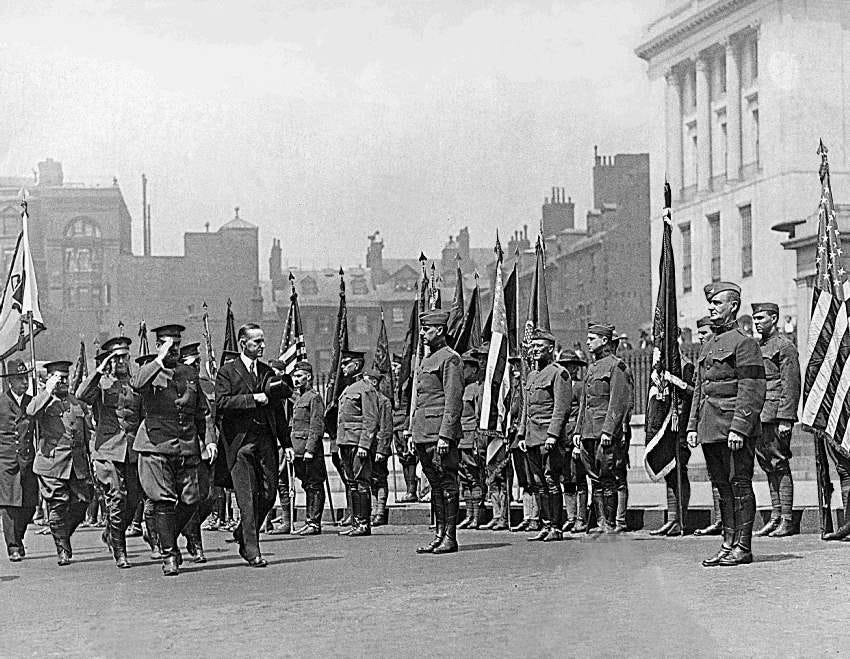On This Day in 1919, Boston’s Police Strike Brought the City to Its Knees
When Boston’s protectors walked out, the city fell into chaos
Boston has always worn its history like a second skin. A city forged in revolution, it has never been afraid of protest. But on this day in 1919, it wasn’t students, workers or radicals that took a stand. It was the very men sworn to keep order.
At 6 p.m. on 9 September, over eleven hundred Boston police officers walked off the job. Their reasons were plain: unlivable wages, vermin-infested stations, and a commissioner who saw any request for change as mutiny. What followed was three days of fire, looting and violence. Nine people were killed. A city collapsed. And America learned what it looks like when authority doesn’t just falter, it disappears.
This wasn’t just a strike. It was a moment when two visions of society clashed: one that demands order at all costs, and another that believes dignity and fairness cannot be reserved for the powerful alone.
Years of Neglect, One Night of Collapse
The seeds of the strike were sown long before September. Since 1913, Boston's cost of living had soared by 75%, but police pay had only edged up by 18. Officers were expected to work thirteen days out of fourteen. Even on their rare day off, they could be dragged back to cover a shift. They paid for their own uniforms, served in crumbling stations and shared space with rats.
Most of these men had returned from war. They had served their country and come home to poverty. The city offered them nothing but longer hours, lower pay and worsening conditions.
For years they petitioned Commissioner Edwin Upton Curtis. Not for luxuries, but for the basics: enough to survive, and enough rest to stay sane. He dismissed every request. When they tried to form a union, he called it insubordination. When they joined the American Federation of Labor, he suspended the organisers. When they voted to strike, he accused them of threatening the public.
In Curtis’s world, order was sacred, and workers’ rights were not. By the time he suspended nineteen more officers on 8 September, he had made his position clear. The police could either submit or disappear.
They chose to disappear.
Into the Void: The Night Boston Fell Apart
What do you get when every police officer in a major American city vanishes at once? The answer came quickly.
The streets of Boston became a stage for opportunists. Rioters and looters surged through neighbourhoods. Shop windows were smashed. Fires broke out. Gunshots echoed between buildings. Nine people died before order was restored.
Students from Harvard formed patrols, volunteers armed with wooden batons. They meant well, but they were not law enforcement. Crowds laughed at them, then threw rocks. In Scollay Square, 10,000 rioters surged past them. In South Boston, looting was unstoppable.
By the end of the first night, the illusion of control had vanished. Volunteers were beaten in the street. The mayor begged for help from the Massachusetts State Guard. Curtis hesitated, then gave in.
Troops arrived with rifles and machine guns. They imposed curfews, broke up crowds and flooded the city with military force. Only then did the chaos begin to subside.
But the most significant battle was no longer in the streets. It was playing out in press releases, governor’s mansions and the national conversation.
The Politics of Law and the Price of Defiance
From the moment the strike began, Massachusetts Governor Calvin Coolidge saw an opening. He had kept silent during the build-up, but once the violence erupted, he acted fast. With carefully chosen words, he laid down his position: “There is no right to strike against the public safety by anybody, anywhere, anytime.”
It was a clean, uncompromising message. It turned public opinion against the strikers overnight.
By 13 September, the union leaders were ready to call off the strike. But Curtis refused to rehire any of them. Every man who had walked out was now permanently dismissed. A new force was built from scratch, mostly military veterans. Ironically, they were given many of the benefits the original officers had demanded: higher pay, better hours, and improved conditions.
But there was one line that would not be crossed. No more unions. No more challenges to authority.
Coolidge, the man who capitalised on the unrest, would ride that stance to the vice presidency the next year. And when President Harding died in office, he would become the 30th President of the United States.
A Legacy of Fear and Lost Ground
The Boston Police Strike didn’t just shatter a city; it chilled a movement. After the dust settled, public sympathy for labour unions evaporated. Talk of socialism and foreign influence, already stoked by the press, turned into a national obsession. Workers who dared to organise were painted as radicals. Their struggles were framed as threats to peace, not pleas for fairness.
The police had tried to fight for their fundamental rights. They ended up losing their jobs, their reputations and the support of the people. In doing so, they handed politicians like Coolidge a powerful narrative: that order must come before all else, and anyone who challenges it should be punished, not heard.
And that message, once spoken, spread fast.
Today, the events of 9 September 1919 serve as a reminder of how fragile public trust can be. Strip workers of dignity for long enough, and eventually, they will push back. But if that push comes at the wrong time or in the wrong way, the results can be devastating.
Boston burned because those in power refused to listen. They chose control over compromise, and they got chaos. It should never have come to that.


